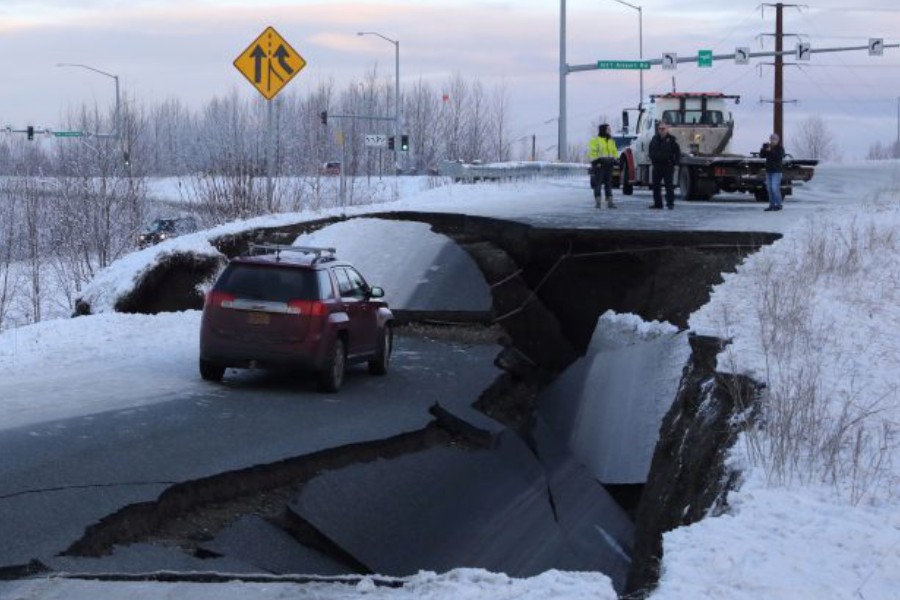A major 7.0 magnitude earthquake has struck Alaska, causing people to run from buildings and briefly prompting a tsunami alert for coastal areas.
The quake was centred about seven miles (11km) north of Anchorage, the largest city in the state, according to the US Geological Survey (USGS).
A series of aftershocks were recorded following the initial shock, which had a depth of 40.9km, the USGS said.
Around 300,000 people live in Anchorage with 100,000 in the surrounding area.
The earthquake was reported at 08.29 local time (17.29 GMT), the USGS added. One of the more powerful aftershocks that followed minutes later had a magnitude of 5.7.
So far, officials have registered 40 aftershocks: 10 with magnitudes above 4.0 and three with magnitudes above 5.0, the Alaska Earthquake Center reported.
"The aftershocks are nerve-wracking, but we want to stress that they are what we would expect for an earthquake like this," the centre said in a tweet.
The quake was picked up by seismometers across the country in Boston, thousands of miles away.
A tsunami warning issued for the Cook Inlet and southern Kenai Peninsula regions was later cancelled.
Alaska's Governor Bill Walker has issued a declaration of disaster, reports the BBC.
President Donald Trump tweeted that the "great people of Alaska" have been "hit hard by a 'big one'".
An earthquake of magnitude 7.0 and higher can cause, at minimum, considerable damage in normal structures and can destroy poorly constructed structures, according to the USGS.
Officials are encouraging people to use social media and text messages to contact loved ones as phone lines may be overwhelmed.
"Stay off phone lines if you possibly can, we need phone lines open," said Anchorage Fire Department Chief Jodie Hettrick. "Keep an eye on each other, check on your neighbours - especially if they are elderly or disabled."
There are currently no reports of casualties.
Police and fire teams are co-ordinating with Alaska State Troopers and National Guard, according to police chief Justin Doll.
Around 10,000 residents are currently without power and there have been some reports of building and bridge collapses.
"Some of the damage is more obvious; some parts of the highway have sunken in and completely disappeared," Chief Doll said. "We are assessing that - significant damage that will probably take a long time to repair."
Footage and images posted on social media showed products scattered across floors of supermarkets with shelves collapsed and lighting damaged.
The quake has also caused roads to break apart and other structures to collapse. Locals have also shared images of buildings on fire in the aftermath.
Alaskan Senator Lisa Murkowski told reporters that damage in Anchorage could have repercussions throughout the state. She said she was worried about the situation.
"This was located in the very heart of the population centre," the senator said, speaking in Washington DC.
"Anchorage is the regional hub for most of the goods that come to the state of Alaska – 85 per cent of the goods - whether it's your bread, your milk, your lettuce or your building supplies."
Air and rail travel has been disrupted by the quake as well. One of the state's largest internal airline services has suspended operations until midday, but the Anchorage Airport is still open.
Local resident Travis Starling told the BBC there is currently no power or water and most radio stations are off air as aftershocks continue.
Mr Starling said that at this time of year, the state sees only six hours of daylight - "We're fortunate on timing... this happened just at sunrise."
"The aftershocks of the one today have been worse than any earthquake I've ever been in before," he said.
Former Alaska Governor Sarah Palin tweeted that her home was damaged in the quake.
The largest quake in US history occurred in Anchorage in 1964. The magnitude 9.2 quake was the second-largest ever measured, worldwide, and devastated the region.
Earthquakes are common in Alaska, which is part of the Ring of Fire region - a string of volcanoes, earthquake sites and tectonic plates around the Pacific stretching from South America to New Zealand.
Most of Alaska's quakes take place deep beneath the earth or far out at sea and do not cause major issues.


